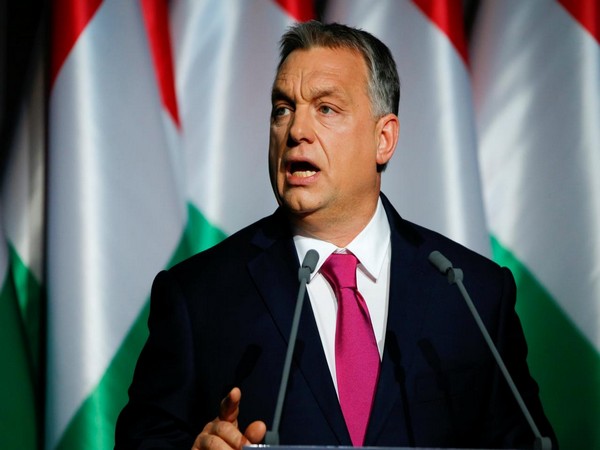Viktor Orban Urges Ceasefire in Kyiv for Accelerated Peace Talks
Hungarian Prime Minister Viktor Orban urged Ukrainian President Volodymyr Zelenskiy to consider a ceasefire to expedite peace talks with Russia. Orban's visit to Kyiv, coinciding with Hungary's EU Council presidency, aimed to explore bilateral cooperation and address ethnic Hungarian rights in Ukraine. Kyiv remains committed to its peace summit strategy.

Hungarian Prime Minister Viktor Orban urged Ukrainian President Volodymyr Zelenskiy on Tuesday to consider a ceasefire to accelerate an end to the war with Russia, but Kyiv said it saw its own approach as the path to peace. Orban, who is an outspoken critic of Western military aid to Ukraine and has the warmest relations of any EU leader with Russian President Vladimir Putin, held talks with Zelenskiy during his first trip to Kyiv in more than a decade.
In joint statements to reporters after the talks, Orban said he asked Zelenskiy to think about a ceasefire before the follow-up international summit Kyiv hopes to hold later this year. "A ceasefire connected to a deadline would give a chance to speed up peace talks. I explored this possibility with the president and I am grateful for his honest answers and negotiation," he said.
Zelenskiy, who spoke before Orban, did not respond to those comments. But his foreign policy adviser, Ihor Zhovkva, later said in televised remarks that it was not the first such proposal and that Zelenskiy had responded to Orban with his publicly known stance. "We say that Ukraine really wants peace for itself, this is logical... For this, we have a tool - the peace summit," Zhovkva said, referring to Kyiv's push to build a global coalition to support its vision of peace.
After hosting dozens of world leaders at a summit in Switzerland last month to advance that blueprint, Kyiv has said it hopes to hold a second international summit later this year that could invite a Russian representative to attend. Officials in Kyiv have often said Russia would use any let-up in fighting to regroup and strengthen itself for another, even larger attack on Ukraine.
In his statement to reporters, Zelenskiy touted the possibility of a broad bilateral cooperation agreement between Ukraine and Hungary. "...the content of our dialogue today on all issues can become the basis for a bilateral document between our states, a document that will regulate all our mutual relations," he said.
Welcoming Zelenskiy's comments, Orban said Hungary would like to help in modernising Ukraine's economy. Ties between the neighbours came under heavy strain after Russia launched its full-scale invasion of Ukraine on Feb. 24, 2022, with Budapest often opposing European Union efforts to support Kyiv.
Under Orban, who upset Western partners by holding talks with Putin last October, Hungary has repeatedly accused Ukraine of curbing the rights of roughly 150,000 ethnic Hungarians living in the far west of Ukraine. Ukraine has denied Budapest's assertion that it is restricting the rights of Hungarian speakers in western Ukraine but says it is open to addressing any concerns.
Ukraine is keen to secure Hungary's backing as it relies heavily on financial and military support from the 27-member EU, where unanimity is needed for many decisions. CHALLENGES
Orban linked Tuesday's surprise Ukraine visit to Hungary having assumed the six-month rotating presidency of the European Council on Monday. "The aim of the Hungarian presidency is to contribute to solving the challenges ahead of the European Union. That's why my first trip was to Kyiv," Orban wrote on Facebook.
Last week, the EU opened formal membership talks with Kyiv at its summit in Brussels, giving Ukraine a morale-lifting boost, although a long and tough road still lies ahead before it can join the bloc. Zelenskiy and Orban were filmed on the sidelines of that summit in what looked like an emotional exchange.
Last year, Orban told Putin that Hungary had never wanted to oppose Russia. In early 2024, it took the EU leaders weeks to break the Hungarian prime minister's veto to extend 50 billion euros ($53.67 billion) in new aid to Ukraine. Kyiv passed a law in 2017 that required all schools to teach students over the age of 10 in the Ukrainian language. Hungary saw this as a breach of the ethnic Hungarian minority's rights.
Some changes were made in December 2023 when the issue became critical for Kyiv's EU accession talks. Budapest said the changes were an improvement but didn't go far enough. ($1 = 0.9316 euros) (Additional reporting by Gergely Szakacs, Olena Harmash, Yuliia Dysa; Writing by Tom Balmforth, Editing by Gareth Jones and Alistair Bell)
(This story has not been edited by Devdiscourse staff and is auto-generated from a syndicated feed.)
ALSO READ
Antony Blinken's Crucial Talks on Gaza Ceasefire and Hostage Release
South Sudan Peace Talks in Turmoil: Vice President Alleges New Draft Aims to Replace 2018 Deal
South Sudan Peace Talks Face Controversy Over 2018 Agreement Replacement
Netanyahu's Stance Complicates US-backed Gaza Ceasefire
Colombian Government and Segunda Marquetalia: Renewed Peace Talks for a War-Torn Nation










